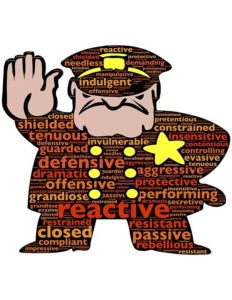Are You Defensive? How Defenses Can Help Or Hurt Us
 Many of us have been accused of being “defensive” at one time or another. This typically happens when we are in a heated discussion or argument with someone close to us.
Many of us have been accused of being “defensive” at one time or another. This typically happens when we are in a heated discussion or argument with someone close to us.
Defending yourself is a natural process which can happen automatically.
Our psychological defenses, the Defense Mechanisms, serve to protect us from experiencing stress, often brought on by our own distortion of reality!
Basic psychological theory tells us that our ego, the part of our psychic structure that tries to mediate between our powerful inner impulses and the outside world, is constantly trying to keep us sane and free of anxiety.
That is no small task. In fact the ego is under a lot of pressure.
The concept of Defense Mechanisms was originally created by Sigmund Freud but it was Anna Freud (Sigmund’s daughter) in her book, The Ego and Mechanisms of Defense, who clarified and enhanced the concept.
They have become part of our culture and help to explain much of our behavior.
The Ego Defense Mechanisms: Our Inner Structure
The Ego Defense Mechanisms are mostly unconscious psychological processes. We really don’t think about them, they just happen automatically. They develop early on as we grow from childhood.
The Ego is the part of the personality that helps us deal with the real world. Freud’s theory of personality, from which the idea of the Ego is derived, is far too complex to review in this post.
Part of the theory, simply put however, is that all humans develop defense mechanisms to deal with deep feelings of hurt, anxiety, guilt, shame, fear, incompetence, embarrassment, self-loathing or sadness.
These feelings are very difficult to cope with. We must develop ways to manage our internal stress and anxiety, often caused by these feelings, so that we can function in the world. It is the job of the Ego to manage our feelings while adjusting to the reality of our circumstances.
In effect the Ego develops ways for us to present ourselves to others while reducing our internal stress. The defense mechanisms that the Ego employs serve a useful and protective function. They are adaptive and help us to integrate successfully into our world.
If our defenses are flexible and function well we can achieve a balanced life and often have good relationships with others.
If they are rigid and too vulnerable to distortion in thinking, they can cause both internal and interpersonal conflict.
Why Are We So Complicated?
 Because humans are so complex and our perceptions so subjective, we can sometimes distort reality, making it very difficult to resolve a problem.
Because humans are so complex and our perceptions so subjective, we can sometimes distort reality, making it very difficult to resolve a problem.
In the case of an alcoholic or drug addict for example, the defense mechanism of Denial protects him from facing the truth about his problem. Even when others present the facts and show him how he has caused himself and his loved ones pain he will distort those facts and defend himself using Denial.
Defense mechanisms can be faulty or inadequate and can do us harm when they become the primary method of dealing with stress.
In the example of the alcoholic, using Denial helps him to distort reality thereby reducing his anxiety. If he accepted the fact that he had a problem, and stopped using Denial, he’d have to deal with life without alcohol and that could cause him greater anxiety. However, relying on Denial as his primary defense keeps him trapped in the addictive behavior.
Rationalization is another defense mechanism that you’ll recognize because it is so common. It is used when we are faced with something that is too difficult to accept so we make up a “logical” reason to fit the circumstances.
For example, if someone has interviewed for a great job that is 45 minutes away by car and is then turned down, he might say that he really didn’t want the job anyway because it was too far away.
In this example Rationalization helps him to deal with feelings of being rejected and serves to soften the blow of losing the job opportunity.
We all use defense mechanisms; but again, it is only when they are used as the primary way we deal with life that it can become a problem.
The Top 11 Defense Mechanisms: Which Ones Do You Use?
The following are some of the most recognizable defense mechanisms. See if you can identify which one(s) work best and help you the most in everyday life.
1. Denial: It is the refusal to accept what is real and acting or behaving as though we do not recognize the consequences of our behavior. The example was given of the alcoholic denying the obvious negative impact his addiction was having on his family.
2.Displacement: It is the shifting or redirecting of feelings from a dangerous target to a less dangerous target. For example, if your boss gets you angry you might yell at your spouse or child instead of risking the loss of your job by becoming angry with your boss.
3.Idealization: It is a type of denial but takes the form of holding a person in such high regard as to make them “all good” without any real faults. This defense enables the person using it to mask any negative feelings they have for the idealized person. An example here might be someone who will not allow himself (or anyone else) to say anything negative, about his mother or father, even if it is true, because he can’t tolerate or admit feeling negative towards them. Instead the person might talk about them as though they were “perfect” parents.
4.Intellectualization: It is the excessive use of thought or abstraction without the emotional component in an attempt to detach from what otherwise might be very powerful and uncomfortable feelings. For example, when told of a loved one’s terminal illness a person might focus on the statistical likelihood of the person getting well and not allow feelings of grief or sadness to get felt.
5.Projection: It is the attribution to others of the negative or unacceptable thoughts we have of ourselves. For example, we might be angry with our spouse and accuse him of being hostile towards us. We can’t deal with the angry feelings so we project them onto the spouse.
6.Rationalization: It is coming up with explanations to justify a situation while denying your feelings about it. The example was given of not getting the job you wanted and then rationalizing that it was too far away anyway.
7.Regression: It is returning to an earlier stage of development where childish behavior might have been more acceptable. For example, we might have a temper tantrum if something doesn’t go our way.
8.Repression: It is the pushing into the unconscious and out of our awareness the most unwanted thoughts or feelings. These feelings are usually very painful and could cause us great upset. An example might be sexual abuse at an early age that remains “forgotten”.
9.Reaction Formation: It is taking the opposite position or reacting in the opposite way you feel because, if you reacted in the way you truly felt, you would become too anxious or uncomfortable. An example might be acting as if you are very fond of someone you actually dislike. The difference between just simply being phony and using this defense, is that you really convince yourself that you like the person.
10.Sublimation: It is the conversion of socially unacceptable desires or impulses into more acceptable and constructive actions. An example might be a man who has grown up with angry impulses he has had to repress chooses a career as an MMA fighter, thereby being able to channel that anger into a more acceptable form of expression.
11.Undoing: It is an attempt to get rid of guilty or uncomfortable feelings by compensating another, whether the compensation is real or symbolic. The feelings may come from thoughts and not from actual deeds. An example may be a loving spouse that has sexual feelings for a neighbor who may suddenly decide to give his wife an expensive present, in effect compensating the spouse as a way of dealing with or reversing the lustful thoughts for the neighbor.
Defense Mechanisms and Relationships
Not realizing that you are using your Defense Mechanisms as your primary way of dealing with the world can prevent you from growing emotionally, intellectually and spiritually.
A highly defended or rigid person is unlikely to show vulnerability in a relationship, causing their partner to feel disconnected, unappreciated or unloved.
The highly defended person is often misinterpreting their partner’s body language, tone or words. Communication can be seen as critical, demeaning or hostile and cause unnecessary conflict.
It is only when one begins to understand themselves and what motivates their behavior that they are able open up and feel free to share with their life partner. Communication then becomes more fluid and grace can be granted to each other for an occasional misstep.
Other articles of interest:
The Top 10 Barriers to Self Growth
Is It Realistic To Expect Happiness?
Burnout: Prevention and Recovery
About the Author
Dr. Stan Hyman is a licensed psychotherapist and life coach in private practice in Miami, Florida. As a Marriage Counselor and relationship expert, he works with couples struggling with powerful issues such as conflict, infidelity and intimacy. He also specializes in treating addictions, anger, anxiety, stress, depression and work life balance.
